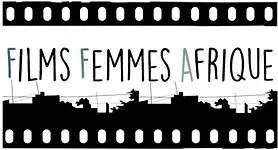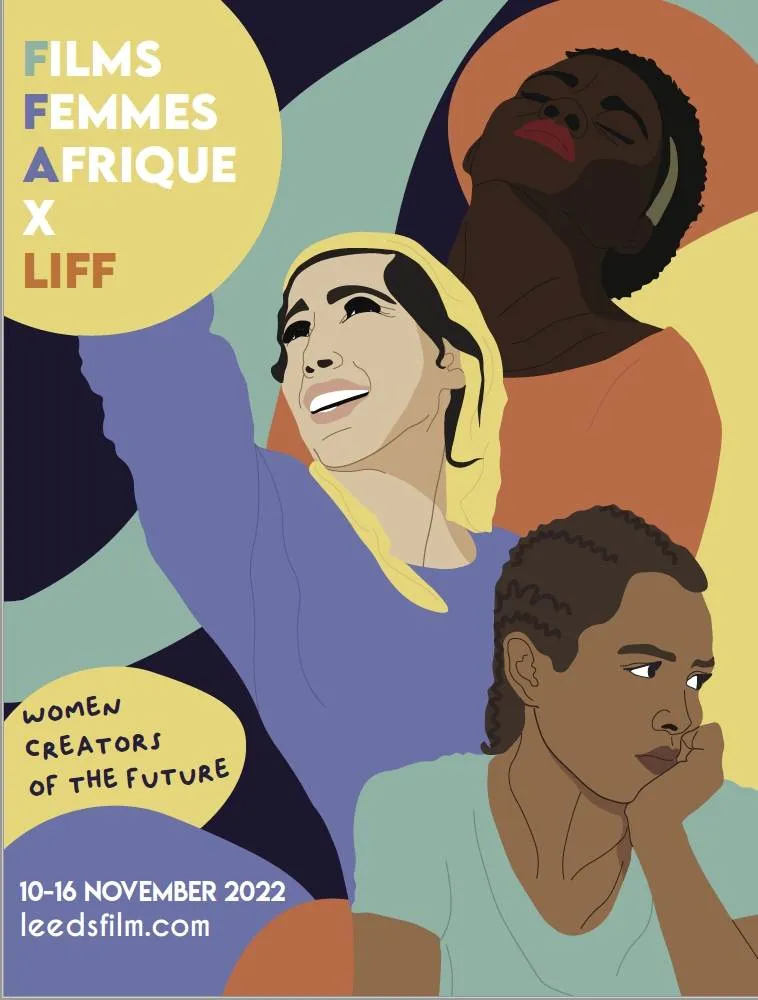Leeds International Film Festival – Festival Films Femmes Afrique
- Leeds, UK
About Leeds International Film Festival (LIFF)
 Founded in 1987, LIFF is one of the largest and longest-running international film festivals in England. It is supported by the Leeds City Council. It has been held annually across different venues in Leeds since its first edition. In 2020, the festival took place online due to the global pandemic of COVID-19. The festival returned to the local screens of Leeds in 2021. It is a ticketed event which, in 2022, was mainly hosted in the Everyman Cinema, in Leeds city centre.
Founded in 1987, LIFF is one of the largest and longest-running international film festivals in England. It is supported by the Leeds City Council. It has been held annually across different venues in Leeds since its first edition. In 2020, the festival took place online due to the global pandemic of COVID-19. The festival returned to the local screens of Leeds in 2021. It is a ticketed event which, in 2022, was mainly hosted in the Everyman Cinema, in Leeds city centre.
About Festival Films Femmes Afrique (FFFA)
 FFFA has become a leading film festival in Senegal, welcoming directors and films from all over the world and engaging with and increasing number of audiences in the country. Founded in 2003, the festival did not return until 2016, to be help on a biennial basis. The festival offers an entirely free programme across a large number of venues in the country, promoting accessibility and inclusivity, and aligning with its mission of bringing cinema (back) to Senegalese audiences, participating in the dissemination and democratisation of African cinemas. Ever since the re-surge of cinema venues in Senegal, particularly in Dakar, since 2017, the festival has been including those newly opened cinemas as part of the festival spaces, largely contributing to their audience development. The festival further aims to contribute to raising awareness and to develop critical thinking, rethinking the place of women in our societies and fighting for the equality of rights between women and men.
FFFA has become a leading film festival in Senegal, welcoming directors and films from all over the world and engaging with and increasing number of audiences in the country. Founded in 2003, the festival did not return until 2016, to be help on a biennial basis. The festival offers an entirely free programme across a large number of venues in the country, promoting accessibility and inclusivity, and aligning with its mission of bringing cinema (back) to Senegalese audiences, participating in the dissemination and democratisation of African cinemas. Ever since the re-surge of cinema venues in Senegal, particularly in Dakar, since 2017, the festival has been including those newly opened cinemas as part of the festival spaces, largely contributing to their audience development. The festival further aims to contribute to raising awareness and to develop critical thinking, rethinking the place of women in our societies and fighting for the equality of rights between women and men.
About the co-curated strand
‘Women Creators of the Future’ was a spotlight programme within the 36th Leeds International Film Festival (LIFF) in 2022, co-curated in partnership with the Festival Films Femmes Afrique (FFFA), which is a film festival in Senegal showcasing African cinema with a focus on women. Whilst the LIFF took place from 3 to 17 November 2022, this specific strand opened on 9 November and concentrated most of its titles until 14 November 2022. The strand was named after the theme of the 5th FFFA [Femmes créatrices d’avenir], which took place from 25 February to 5 March 2022 in Dakar and from 6 to 12 March 2022 across several Senegalese regions. FFFA had been a reference for curators involved in the LIFF for the past few years, as an attempt to include more films directed by women from different parts of the world in the programme. It counted on the presence of Amayel Ndiaye, who was also invited as a jury member and commissioned for the graphic design of the poster of the strand.
In 2022, thanks to the support from the British Council, such a source of inspiration was brought to the frontline among audiences in Leeds. Whilst the FFFA curates women-centred films directed by directors from all genders alike, at LIFF the selection only included films directed by women. Its catalogue described the selection as films that “tell remarkable stories of African women”, and being composed mainly of debut features, “highlighting the sheer talent of female filmmakers across the continent” (see page 69 in the festival catalogue). The strand was composed of ten feature length films and a programme of six short films. The opening film was Anisia Uzeyman and Saul Williams’ Afro-futuristic film Neptune Frost (2021, Rwanda-France, 105 min.), and it was followed by panel discussion on African Cinema and Cinephilia, held in collaboration with the ‘New Voices in Cinephilia’ project, led by Dr Rachel Johnson and Prof Stephanie Dennison at the University of Leeds.
About the Research Process at ‘Women Creators of the Future’, LIFF-FFFA
 We are grateful to the Leeds International Film Festival in collaboration with the Festival Films Femmes Afrique for the access provided to trial this methodology, being available to us for the implementation of the Decolonial Test and follow-up focus group, and for the range of spaces and resources shared with us for the purpose of this project. Special thanks to the co-curators of the strand ‘Women Creators of the Future’, Molly Cowderoy (LIFF) and Amayel Ndiaye (FFFA), who were our main festival contacts when we sent the invitation letter to be a festival partner.
We are grateful to the Leeds International Film Festival in collaboration with the Festival Films Femmes Afrique for the access provided to trial this methodology, being available to us for the implementation of the Decolonial Test and follow-up focus group, and for the range of spaces and resources shared with us for the purpose of this project. Special thanks to the co-curators of the strand ‘Women Creators of the Future’, Molly Cowderoy (LIFF) and Amayel Ndiaye (FFFA), who were our main festival contacts when we sent the invitation letter to be a festival partner.
We had initially intended to trial this method at the Festival Films Femmes Afrique. The outcome of the funding application was first scheduled for January 2022, which would have allowed us to travel to the Festival Films Femmes Afrique 2022 for the purpose of this project. The notice of decision, informing us that the project had been approved for funding, was not received until 14 February 2022, but the results were embargoed for a couple of months later. Estrella Sendra still travelled there with funding from the Screen Worlds project, as an advisory board member whose main role was to engage publicly, collaborating with festivals and cultural institutions in the organisation of events.
Whilst during this trip no fieldwork was done for the purpose of this project, the involvement in this festival was a great opportunity to understand its mission, management, and approach. Estrella Sendra had already had an initial contact with the festival founding director, Martine Ndiaye, in an online interview about the 2020, which took place from 21 February to 7 March 2020, just before the lockdown in Senegal because of the global pandemic of COVID-19. This conversation informed a presentation delivered by Estrella Sendra for the Transnational Screen Media Practices: Safeguarding Cultural Heritage symposium organized by Sheila Petty, online, at the University of Regina, in June 2021. This was entitled ‘Curating African Women on Senegalese Screens: The Festival Films Femmes Afrique’. When Estrella Sendra returned to Senegal after the lockdown, in December 2021, she met in person with Martine Ndiaye at the Centre Yennenga in Grand Dakar, where their office is based, and discussed the possibility of a collaboration.
Estrella Sendra, who had completed a PhD on cultural festivals in Senegal in 2018, had always had an interest in attending, research and collaborating with this festival, centred on women, and which was resuming in 2016 after 13 years of interruption. Since the festival runs on a biennial basis, every other year, having missed the 2022 edition for the fieldwork for the purpose of this project, and being this due to be completed in February 2024, it was no longer possible to include FFFA as part of our research sample, as desired. The experience of attending the festival was still highly inspiring, due to the innovative way of working with audiences, which led Estrella Sendra to write up the article ‘Travelling Towards Audiences: The Decentralization of Festival Spaces at Festival Films Femmes Afrique Festival in Senegal’, forthcoming in the Journal of Festival Studies.
When we became aware of the collaborative strand between LIFF and FFFA, through the co-curated strand ‘Women Creators of the Future’, we found it a great opportunity to conduct research on a new initiative, arguably triggered by an intention of change within the LIFF, and coherent with the spread across festival spaces that characterizes the FFFA. Being one of our research collaborators based in Leeds, Dr Rachel Johnson, a regular festival-goer, made it also particularly relevant. Rachel Johnson had also approached the festival organisers for a collaboration, a panel discussion on ‘African cinema and cinephilia’, followed one of the film screenings, with her film students among the audiences, as part of her project ‘New Voices in Cinephilia’, along with her colleague Prof Stephanie Dennison. Aware of the fact that Estrella Sendra would travel to Leeds for the purpose of this festival, instead of the one in Senegal (which would not happen until 2024), Rachel Johnson invited her as a one of the panelists, along with Amayel Ndiaye, co-organiser of FFFA, and Mosa Mpetha and film programmer and co-founder of the Black Cinema Project.
This outline reiterates the importance of taking into account the previous relationship with the festival in the research design, as well as the nature of festival. When conducting the interview, at times it was difficult to just refer to the strand, speaking also about the broader LIFF or FFFA, which resulted an opportunity to understand more about each of these festivals, separately.
Bellow, there is a chart outlining the researchers involved in the pilot implementation of this test in LIFF-FFFA.
FFFA-LIFF (Leeds, UK) 3-17 November 2022, strand ‘Women Creators of the Future: 9-16 November
Lead Researcher
Research coordinator
Researcher present for fieldwork
Fieldwork dates
Decolonial Test 1
Decolonial Test 2
Follow-up Focus Group
Estrella Sendra and Rachel Johnson, with research participants, on 26 January 2023.
Participants included:
- Molly Cowderoy (curator of the strand, from LIFF)
- Amayel Ndiaye (curator of the strand, from FFFA)
- Alexander King (staff member, LIFF).